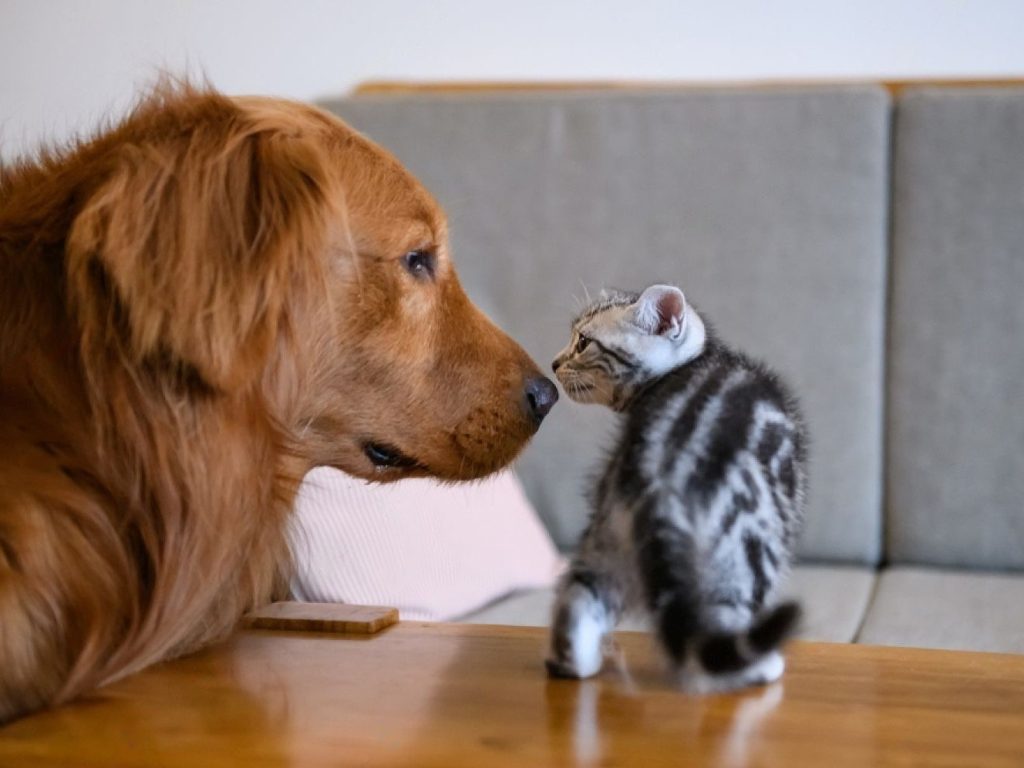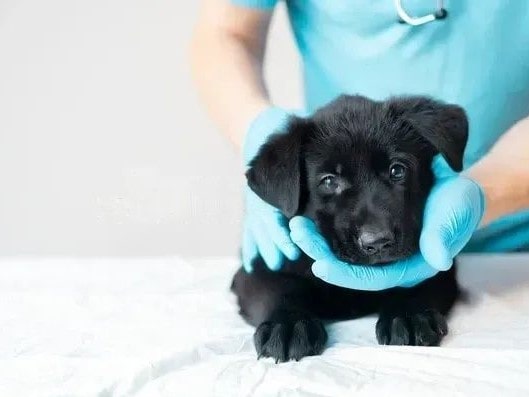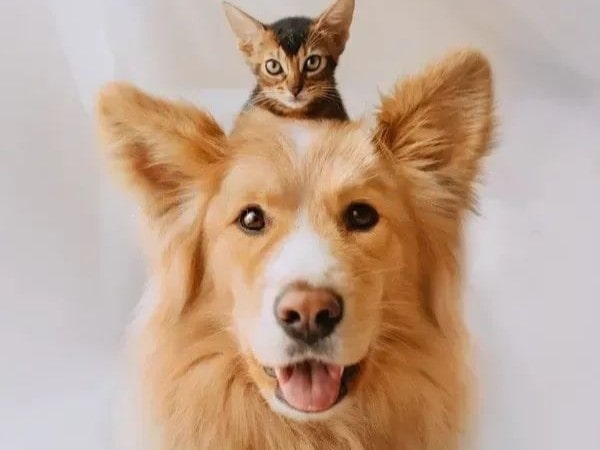Do dogs and cats share the same shelter? They easily get jell up? Are dogs really scared of cats? Is it easy to train them?
To answer all your clouds of doubts, we have done some footwork regarding, these common questions. Which will surely help you to know better about your canine, and his fear factor.
Key Takeaways
- Well, dogs are not really afraid of cats, it solely depends upon the experience/situation.
- If you train your little fido well and make a proper introduction then he might easily get jell up with felines.
- Don’t force your pooch to deal with his phobia.
- Reward him whenever he responds in a positive manner.
So, let’s dig in more to explore the exact answer and solutions. If your pup is really scared of cats, then how are you will gonna resolve it, and whether a forceful bond will work or not?
Keep reading for more.
Contents
Are Dogs Really Afraid of Cats?
“Dogs and cats, living together…mass hysteria!” (Dr. Peter Venkman, Ghostbusters, 1984).”[1]
Both dogs and cats have aggressive natures and have a habit of marking territories. We can say that their behavior clashes, and so it can be one of the basic reasons they don’t usually get along well.

If you train your little one well and then introduce them. Your pup will jell up with felines and won’t encounter any such phobia.
On the other hand, adult dogs don’t get along really well. This is because of their aggressive behavior, and they think the other one is trying to attack or occupy their space.
How to Overcome Your Fido’s Fear?
“Cats and dogs have a range of interactions.[1] The natural instincts of each species lead towards antagonistic interactions, though individual animals can have non-aggressive relationships with each other, particularly under conditions where humans have socialized non-aggressive behaviors.“

Since we know both cats and dogs have different interaction behavior and they don’t easily get along. So if you want a happy and peaceful environment, where they both live in peace, without any fear.
We have done some good observations, seek vets, and expert advice, and come up with a solution. Plus, few tips that will help you to overcome your pup’s irrational phobias.
Keep reading to know how to help your fido to behave less anxious when he is around felines.
1. Try Friendly-Introduction
The first impression is the last impression. Right? Sound familiar?
Well, just like humans, animals also have this thing, if they are not comfortable around someone they won’t tolerate them.

So, it’s very important if you want your feline, and pup to get along, or pup to get along with neighbors’ cats, you have to give a proper introduction. It should be in such a way, that he doesn’t feel scared at first and behaves normally.
PetMD states, “A new study revealed that dogs are more responsive to cat sounds than to the sight or smell of a cat.“[2]
Even if he steps back, assure him that everything is fine, and can safely play here or get along with cats she won’t attack him.
2. Don’t Encourage the Fear
Being a pet parent you cannot see your pup going through any difficulty, or under stress, or anything. You want to calm him down, by snuggling or petting him.

We want to suggest that if you are parenting a little one in his case snuggle him, pet him and bring him back to a normal level. Assure him that it’s ok if he doesn’t want to be surrounded by cats.
But later on, when he is in a normal state try to guide him, and train him to not feel scared around other animals.
If you are parenting an adult one then don’t force him to get along with cats. On the other hand, do not give too much pampering also, or else he will get used to it.
And in small fears also he will try to grab your attention, and won’t overcome it.
3. Use Their Smell Glands
Dogs do detect smell and just like cats, they also mark their territory. So, if you want to connect your pup and feline, try giving them each other’s smell.
In other words, keep them away from each other, use your feline toys as a connecting weapon, and give it to your pup for playing. Let him smell her body scent, make him aware of the smell.
This will help you in introducing your pup to felines because the smell will be familiar, and he will feel the homie’s surroundings.
4. Keep Rewarding Positive Attempts
As we know, dogs are quick learners, and they gregariously follow thier pet parent’s commands. From, the initial days if you teach him anything he will keep in mind and follow it without fail.

For instance, if you train him so well that in one command he completes his given task. Whenever, he does something good, reward him with petting or treats, this way you are boosting his learning skills.
Apply the same technique when your pup encounters his fear, and try to guide him in such a way that he listens to your command when he is around the cats.
Assure him that cats won’t harm him and how to behave when they are around. Plus, keep rewarding him when he is under control and fighting his fear.
5. Seek Vet’s Advice
In our survey, we have come across a few cases, where dogs get so scared of cats that it affects their health. In other words, they display such fearful symptoms that it’s a threat to their health.

So, if you encounter any such thing in your fido, it’s suggested to immediately seek a vet’s advice about his fear. They will prescribe your pup anti-anxiety medicines and a few tricks, which will definitely help you to overcome your fido’s extreme fear.
Plus, it will relax their body so that he doesn’t encounter any severe health complications in the future.
6. Calm Your Fido
If your pup is scared of cats and rapidly gets stressed or nervous when they are around the cats. The first thing, you need to do is pet his back, try to calm him, and assure him he is safe and won’t get hurt by felines.

The calming therapy will help you a lot, it will reduce his fear for a timing, and encourage positivity in him. Plus, built trust in him that he is safe and you will not let anyone attack him.
Basically, give him assurance and trust, after that if he is comfortable then try to contact him with cats or else leave it. Remember, don’t pressurize him to get along with cats.
How Long Does It Take Dogs to Jell up With Cats?
Well, there’s no particular period or something estimated that your pup will take this much time to get along with the feline. It solely depends upon the individual settling down behavior.

In a few cases, it has been seen that dogs take two-three weeks, and they are happy to share one shelter with the feline. But, in other cases, it has also been seen that dogs never agree to share the shelter, and they don’t get along with cats.
So, if you want to observe whether he will be comfortable or not, then keep an eye on his behavior. For instance, he is always in an aggressive mode or tries to settle down with cats. Plus, his body language will help you to get an idea of whether your pup is happy and comfortable around felines.
FAQs
Should I let my dog chase my cat?
Well, chasing is normal in dogs as well as cats they are born hunters. But, if you are parenting both dogs and cats, then it’s not a good idea to let your pup chase your feline, or hurt each other.
How do you tell if a dog is good with cats?
According to the survey, it has been observed that canines can catch cats’ sounds faster than the smell or presence of felines. So, if your pup is comfortable with the sound, and not displaying any aggressive or nervous signs. We can take this in a positive manner so that your pup will get along with the felines.
How can you tell if a dog is aggressive to cats?
Well, dogs do display body signs, which indicate their current mental state, and behavior. If you notice your fido is not comfortable around cats, and he is continuously growling, his body structure is stiff and gives a still look. All these are warning signs that he is in aggression mode, and it’s better to take him away from the cats. And calm him down by petting or snuggling him.
Well, It’s a Wrap!
Just like humans, animals also have fear, it is a part of life.
If your furry pal is having a similar fear issue, now you know well, how to overcome it. It can be tricky but you have to deal with the situation, and assure your pup that you are with him and he is secure.
The best thing is to try a friendly introduction it will cut down many issues, and it will be easy for your pup to jell up with felines. Furthermore, always reward your pup’s positive attitude it will boost his confidence and reduce the fear factor.
In addition, it is suggested to never encourage your dog’s fear and try to calm him down. This is because you won’t be able to resolve your pup’s fear issue, and he will always try to escape from such situations.
A gentle reminder, never force your canine to jell up with cats, if he is not comfortable. This is because it will affect his health, and might create severe complications in the future.
References:
- Mills, D. S., Demontigny-Bédard, I., Gruen, M., Klinck, M. P., McPeake, K. J., Barcelos, A. M., … & Levine, E. (2020). Pain and problem behavior in cats and dogs. Animals, 10(2), 318.
- Landsberg, G., Hunthausen, W., & Ackerman, L. (2011). Behavior problems of the dog and cat. Elsevier Health Sciences.

Dania is a dog groomer living in California, who loves styling dogs. She often uses dog accessories to keep them distracted while grooming. She is also a dog parent to a Pomeranian, Duke. It’s because of him she is always on a lookout for the best dog foods, toys, other dog accessories, and ways to keep him equipped, healthy and happy.


